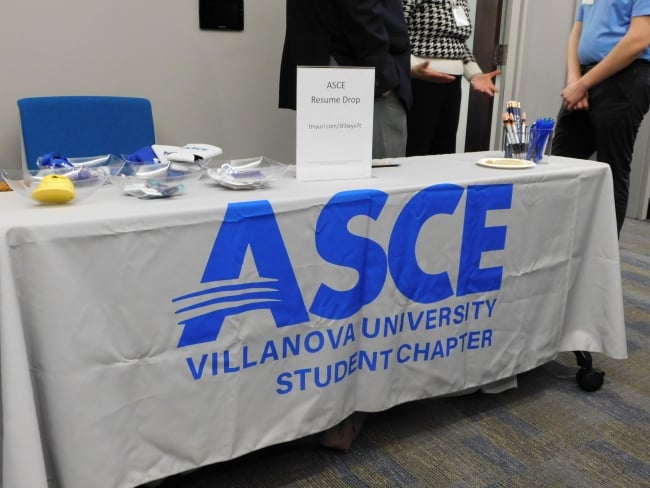You have /5 articles left.
Sign up for a free account or log in.

Villanova University’s student chapter of the American Society of Civil Engineers hosted a civil engineering “meetup” with 19 employers.
Villanova University
Career fairs are one of many ways students can connect with employers to explore different industries, career paths and internship opportunities, but sometimes all careers are not represented equally.
Staff at Villanova University recognized a need to provide a discipline-specific recruitment event for civil engineering students to foster deeper relationships between the learner and industry partners and established an engineering meetup.
The career center partnered with a student organization, creating professional development education for students participating and helping employers find the talent they need in a more focused manner.
What’s the need: When hosting traditional career fairs, staff recognized there was a disproportionate interest from employers looking for civil engineers compared to the number of students at the fair interested in becoming civil engineers.
“We also noticed that more students were being converted from internships into full-time post-graduate positions prior to the fairs—thereby taking seniors out of the market and reducing our supply of civil engineers seeking full-time employment at the fairs,” explains Maggie Songer, executive director of the career center at Villanova.
Further, the timeline of recruitment and internship hiring was moving up, with more companies accelerating the process from spring semester to early fall.
Students from other majors weren’t being served as well at the career fair because of the high number of civil engineering employers looking for a specific kind of students.
To better engage with industry partners and promote equitable networking and recruitment opportunities for students, administrators decided to create a major-specific career fair for engineering students.
How it works: Now, in addition to the usual fall and spring semester career fairs, Villanova offers a specialized event for civil engineering students.
The inaugural meetup was hosted in February in collaboration with the student chapter of the American Society of Civil Engineers (ASCE), with 18 employers from diverse industries and students from every class represented.
“This focused event provided a more intimate setting for meaningful interactions between students and employers,” Songer says.
During the event, there was an open networking time as well as one-on-one résumé reviews and career-guidance meetings between employers and students. These attracted a wider range of students, including those who had already accepted internship and full-time job offers. Students could also get a headshot taken or shop the career closet for professional clothing.
Some of the proceeds from the event, collected from employers for participation, were donated to the ASCE chapter for its professional development fund, to be applied toward conference attendance this calendar year.
The impact: The event met its mark in engaging a greater number of students specifically pursuing civil engineering, but also fostered deeper engagement as participants learned about career paths. Employers also benefited from the focused environment, with 100 percent of employers who responded to a follow-up survey saying the event met their expectations.
Partnering with a student organization also facilitated leadership and professional development opportunities for chapter members, with the executive board providing opening and closing remarks and introducing themselves to the participating employers, Songer says.
Other Kinds of Career Fairs
Some colleges host reverse career fairs, in which the students present themselves and their work, requiring the employer to engage with them. This takes the pressure off the student, which is particularly beneficial for neurodiverse students, and allows employers to identify students who can best fit their needs.
A post-event survey found the average survey respondent rated the event a nine out of 10 (with one being poor and 10 being exceptional).
DIY: For a higher education practitioner considering creating a similar program, Songer offers six pieces of advice:
- Identify demand. Looking at institutional data, practitioners can analyze trends in employer interest and student career aspirations to see where there is the greatest need for targeted programming, particularly where there is a discrepancy between employers and students.
- Collaborate with student orgs. Working alongside a student group can help staff leverage the group’s network and student membership to promote the event, but most importantly, it can help develop student leaders. Student-led events and activities resonate better with peers and can foster a sense of community within a discipline and give students hands-on work experience that will benefit their careers later.
- Emphasize relationship building. In addition to traditional career fairs, programming that prioritizes relationships between students and employers has more meaningful outcomes and can produce mentorship or longer-term connections and advancement. Focused events are better at achieving this goal because they are tailored toward career interests and career pathways.
- Partner internally. Other groups within the university, such as faculty and administration, can serve as resources for career-focused events. At Villanova, the dean of the college of engineering was the first to identify that the U.S. infrastructure bill was creating a heightened need for engineers. Faculty can also help encourage students to attend and participate in events.
- Leverage alumni. “When alumni attend recruiting events, they can more easily relate to current students and spark conversations via shared experiences, allowing for students to feel more comfortable and confident while networking,” Songer says. Staff should conduct outreach to alumni to encourage their participation.
- Solicit feedback and iterate. In trialing something new, staff should continuously solicit feedback from all stakeholders, including students and employers, to assess the program’s effectiveness and identify areas of improvement. This ensures the program is responsive to the current and evolving needs of all parties.
Do you have a career prep tip that might help others encourage student success? Tell us about it.




